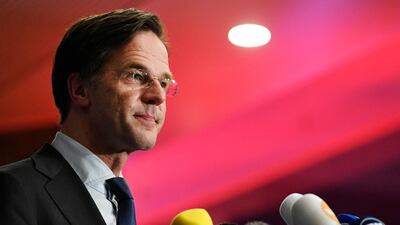Dutch Prime Minister Mark Rutte won a clear victory in Wednesday’s national election to secure a fourth term in office, exit polls showed.
Mr Rutte’s centre-right party, the VVD, is set to win 36 seats in the 150-strong parliament with the pro-European group D66 in second place with 27 seats, its best ever result, according to an exit poll by Ipsos. Geert Wilders’ populists slipped to third place with 17 seats from second in 2017.
The result sets Mr Rutte up to become the longest-serving leader in Dutch history and could signal a more co-operative approach in dealings with the rest of the European Union.
Losses for Wopke Hoekstra, the budget hawk who served as Mr Rutte’s most recent finance minister, and the surge in support for Trade Minister Sigrid Kaag’s D66 may make the next coalition more willing to embrace common EU projects.
“We should co-operate more with France and Germany,” Ms Kaag, who previously worked for the United Nations as a diplomat, said last month during an online seminar organised by the Centre for European Reform, a research institute.
“They set the tone and the agenda. It is important to be trustworthy and that we are the go-to partners for the French and Germans.”
Another pro-European party, Volt, enters parliament for the first time with three seats.
Even so, the process of putting together a coalition could take months.
During an election campaign that was overshadowed by the coronavirus, Mr Rutte has won praise for his handling of the pandemic, adding to his long-standing popularity with voters.
“There is huge work ahead of us,” Mr Rutte said after the polls were released, congratulating Ms Kaag on her “historic” success.
“The biggest task will be leading the country through the [coronavirus] crisis.”
Mr Hoekstra’s Christian Democrats, by contrast, slipped to fourth place with 14 seats. The Christian Democrats and D66 both had 19 seats in the last parliament and Mr Hoekstra may now have to cede the finance ministry to the pro-European group.
“D66 now clearly is the second biggest party of the country and holds the strongest progressive voice,” Kees Aarts, a professor of politics at Groningen University, said in a phone interview.
“This will give them a big voice in a potential new government.”
Mr Hoekstra may have paid the price for the previous government’s strategy of trying hold back deeper integration in the EU, even though Mr Rutte escaped unscathed.
The Dutch last year fought alongside Austria, Denmark and Sweden to water down the 750 billion-euro ($900bn) EU recovery package proposed by German Chancellor Angela Merkel and French President Emmanuel Macron.
During the campaign, Ms Kaag had criticised that approach, arguing that the Netherlands, the fifth largest economy in the bloc, should seek to forge a common project with the EU’s biggest powers.
“The Dutch strategy of making alliances with smaller countries is not in the spirit of Europe,” said Amy Verdun, a visiting professor of European politics at the University of Leiden.
“It is not a winning strategy and I think it will change.”
The first priority for the next government will be to bring the pandemic under control and then rebuild the economy.
Dutch output shrank by 4.1 per cent last year and the European Commission is forecasting an expansion of only 1.8 per cent for 2021, the weakest in the EU.
“We have a big responsibility, the party and myself,” Ms Kaag said in her first comments after the polls were released.
“We need to co-operate and we want to be more progressive, greener and more equal.”


